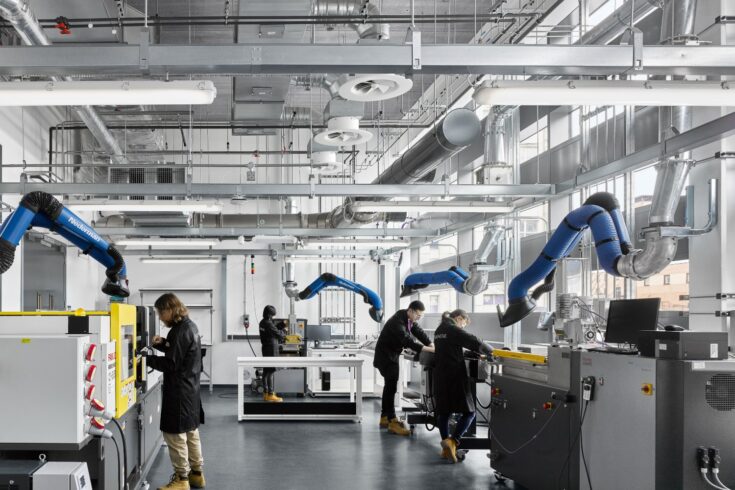Last year’s spending review provided a record budget for research and development (R&D). It signalled the UK government’s commitment to the ambitions in the innovation strategy to advance the nation’s status as a global science superpower.
Now with its three-year budget allocation confirmed, UK Research and Innovation (UKRI) is tasked with helping to turn ambition into reality.
Invested partnerships
Universities are at the heart of this, working with partners in industry and beyond to create new ideas and catalyse innovation.
UKRPIF supports this by forging partnerships around the development of ground-breaking large-scale research infrastructure, where government funding is double matched by the investment from partners. Once built, these pioneering state-of-the-art facilities enable the universities and their partners to develop ambitious solutions to some of today’s biggest research challenges.
With confirmation of £100 million for a new round of competition for UKRPIF, I am excited to see what our universities and their partners can come up with.
Firm foundations
Since UKRPIF was introduced 10 years ago, we have funded 53 projects across six rounds of competition across the UK in areas as diverse as:
- Belfast
- Glasgow
- Leicester
- Swansea
- York.
The total investment of over £900 million has leveraged over £2.2 billion in committed match funding from over 300 industry partners, charitable organisations and philanthropic donors. 39 of these projects have completed construction, many of which are now in operation.
Back in 2019, we reflected on the first five rounds of UKRPIF, recognising the impact it had in supporting world-leading research across a diverse range of disciplines. Since then, we have funded a further 10 projects tackling important challenges facing modern society, including:
- the safe integration of robotics and automated systems
- understanding the social impacts of digital technology
- ensuring the sustainability and resilience of our water supply in the face of climate change and population growth.
Whilst some projects are still being built, others have established themselves as globally leading centres of research and innovation, for example:
- in bringing to market real-world products based on Nobel-prize winning wonder materials
- connecting supply chains to revolutionise the future of rail travel
- championing cross-disciplinary collaboration to drive the UK’s pioneering medicines discovery engine.
More recently, supporting UKRI’s environmental sustainability strategy, UKRPIF has invested £18.9 million across nine of its existing facilities. It enables them to explore innovative approaches to achieving net zero carbon emissions targets and make the research they facilitate more environmentally sustainable.
Realising ambition
A key feature of UKRPIF has been its requirement for projects to leverage double match funding. That means they must secure £2 from non-public sources for every £1 invested by the fund. The numbers above tell the story. This scheme has been highly successful in unlocking private investment in R&D well beyond what is required.
UKRPIF-funded facilities also play an important role in enabling the translation of research and supporting local businesses. They have supported the formation of several innovative spin-out companies that have since raised impressive amounts of private investment.
The success of these partnerships in turn attracts new partners, providing a focal point around which innovative clusters can grow, helping to level-up the local region.
This highlights the value of the UKRPIF in achieving the government’s plans to reach the target of 2.4% R&D intensity by 2027.
Facilities for the future
Now almost three years since the last round of UKRPIF awards were announced, I am eager to see how universities plan to build on UKRPIF’s exceptional track record.
Not only will these new facilities allow universities to conduct more world-leading research, but the partnerships they support and private investment they unlock will be instrumental in delivering against UKRI’s five-year strategy. This will help secure the UK’s position as a globally leading research and innovation nation with outstanding infrastructures and facilities across the breadth of the country.
As in previous rounds, universities can apply for funding of between £10 and £50 million and will need to meet the double match funding requirement. Set to run across this spending review period, funds awarded will need to be spent by March 2025.
A two tranche approach
Applicants in this round will have the option to choose between two tranches:
Tranche one
Tranche one is a one-stage process in which full stage applications will be submitted directly. This is for projects at a more mature stage of development, where the shorter timescale is expected to be more responsive to live opportunities.
Tranche two
Tranche two will be a two-stage process, with an expression of interest stage followed by submission of full stage applications. This is for projects that require further development before they are ready for full assessment (for example, partnership development, planning permission).
What’s next
Research England expects to launch the new round of funding in July, when it will publish detailed guidance on all aspects of the competition including a timeline for the competition. If you have any questions about this opportunity, please contact researchpartnership@re.ukri.org
Top image: Credit: Will Pryce and The University of Manchester



